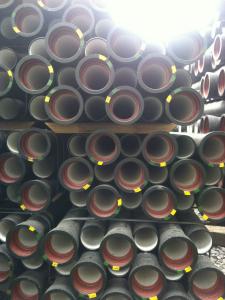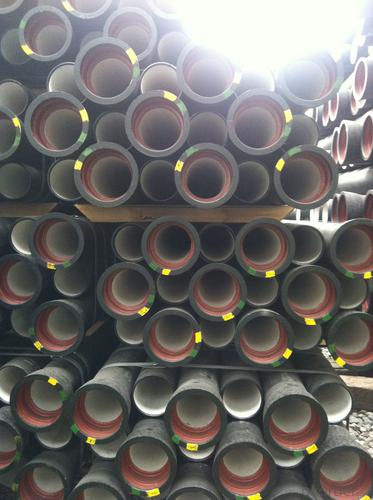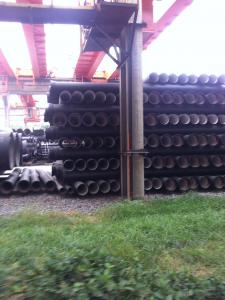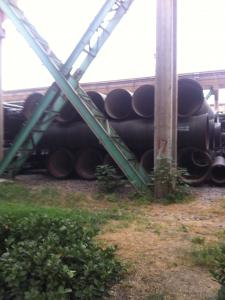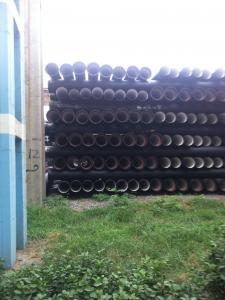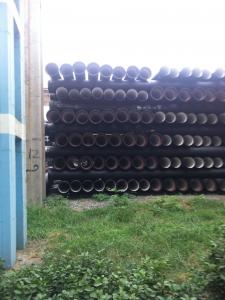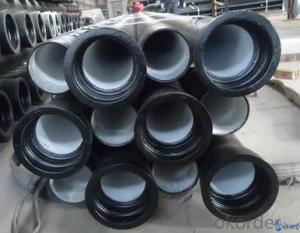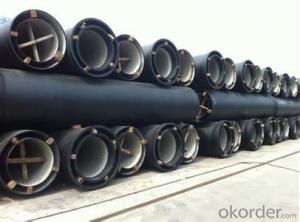DUCTILE IRON PIPES AND PIPE FITTINGS K9 CLASS DN150
- Loading Port:
- Tianjin
- Payment Terms:
- TT OR LC
- Min Order Qty:
- 22 pc
- Supply Capability:
- 3000 pc/month
OKorder Service Pledge
OKorder Financial Service
You Might Also Like
Material : Ductile Cast Iron
Size Range : DN 80mm to DN 2000mm
Unit Effective Length : 6m or 5.7m
Manufacture Standard: ISO 2531:1998/ EN 545:2006/EN 598:2007
Annual capacity : 200,000 tons
Coating Exterior: Zinc 130g/m2 according to ISO 8179-1 and bitumen coating 70 microns.
Cement Interior: Portland Cement/ High Alumina Cement/ Sulphate Resisting Cement Lining according to ISO 4179
Special requirements on external coating and internal lining can be applied
We also provide accessories such as SBR/EPDM rubber gaskets, lubricant paste, pipe caps, PE sleeves, etc.
Additional Parts:
Each pipe is strictly inspected according to related standard to ensure permanently high performance.
Easy Installation at site and service free for life
Long Service Lifespan
Quotation will arrive you within 24hours once we get your inquiry.
We guarantee offering you a competitive price.
A copy of original inspection reports of pipes will be offered after shipment.
Photos of loading process will be sent to the customer after shipment effect.
We will follow-up the delivery progress after shipment effect and update to the customer on weekly basis.
- Q: Are ductile iron pipes suitable for bridge crossings or crossings under roadways?
- Yes, ductile iron pipes are suitable for bridge crossings or crossings under roadways. Ductile iron pipes are known for their strength, durability, and resistance to external forces such as heavy traffic loads or bridge movements. They have a high tensile strength and can withstand the stress and strain caused by the weight of vehicles passing over them. Additionally, ductile iron pipes are highly corrosion resistant, making them suitable for underground installations where they may be exposed to water or other corrosive elements. Moreover, these pipes have a long lifespan and require minimal maintenance, making them a reliable choice for bridge crossings or crossings under roadways. Overall, ductile iron pipes provide a cost-effective and efficient solution for such infrastructure projects.
- Q: How does ductile iron pipe handle temperature changes?
- Ductile iron pipe is known for its ability to handle temperature changes effectively. The unique properties of ductile iron make it highly resistant to thermal expansion and contraction, allowing it to withstand extreme temperature variations without significant deformations or failures. When exposed to temperature changes, ductile iron pipes can expand or contract within certain limits due to its inherent ductility. This flexibility helps to accommodate thermal stresses and prevent the pipe from cracking or breaking. The material's high tensile strength and elasticity also contribute to its ability to handle temperature changes without significant structural damage. Moreover, ductile iron pipes have a low coefficient of thermal expansion, meaning they expand and contract at a relatively slow rate compared to other materials. This characteristic minimizes the potential for stress on the pipe joints and reduces the risk of leaks or failures. In addition to its excellent thermal stability, ductile iron pipe also features a protective lining that further enhances its resistance to temperature changes. The linings, such as cement mortar or polyethylene, create a barrier between the pipe and the transported fluid, preventing any adverse effects caused by thermal variations on the pipe's internal surface. Overall, ductile iron pipe is a reliable choice for applications where temperature changes are common. Its ability to withstand thermal stresses, low coefficient of thermal expansion, and protective linings make it a durable and efficient solution for various infrastructural needs, including water distribution, wastewater management, and industrial applications.
- Q: Can ductile iron pipe be used for directional drilling?
- Indeed, it is possible to utilize ductile iron pipe for directional drilling. This method involves the installation of pipes, cables, and conduits beneath the ground in a curved or horizontal trajectory. Ductile iron pipes are renowned for their exceptional strength and flexibility, rendering them apt for this technique. They can be effortlessly bent and maneuvered while drilling, thereby enabling the installation of pipelines in demanding terrains and the traversing of obstacles such as rivers, highways, and buildings. Moreover, the corrosion resistance of ductile iron pipes is superb, thereby ensuring their durability and reliability for directional drilling endeavors.
- Q: What are the advantages of using ductile iron pipes?
- Using ductile iron pipes in various applications offers several advantages. To begin with, ductile iron pipes possess a high strength-to-weight ratio, making them a cost-effective option for transporting fluids or gases. They can endure high internal and external pressures, ensuring the dependable and efficient transportation of materials. Furthermore, ductile iron pipes exhibit exceptional corrosion resistance. They are impervious to rust and other forms of corrosion, expanding their lifespan and reducing maintenance expenses. This makes them suitable for underground and underwater applications where corrosive elements are present. Moreover, ductile iron pipes demonstrate superior ductility, enabling them to withstand heavy external loads and impacts without cracking or breaking. This renders them less vulnerable to damage during installation or exposure to harsh environmental conditions. In addition, ductile iron pipes possess excellent flow characteristics. Their smooth inner surface minimizes friction and pressure losses, resulting in efficient fluid flow and reduced pumping costs. This is particularly advantageous in applications requiring high flow rates or long-distance transportation. Additionally, ductile iron pipes are environmentally friendly. They are produced from recycled materials and can be recycled themselves, reducing the demand for raw materials and minimizing environmental impact. Furthermore, their prolonged service life diminishes the need for frequent replacements, further reducing waste generation. Lastly, ductile iron pipes offer versatile installation options. They can be installed using various techniques like trenchless methods, which minimize disruption to the surrounding environment and lower installation costs. Their adaptability and ease of installation make them a preferred choice for various construction projects. Overall, the benefits of utilizing ductile iron pipes encompass their high strength, corrosion resistance, ductility, flow characteristics, environmental friendliness, and versatile installation options. These factors establish them as a reliable and cost-effective choice for numerous applications in various industries.
- Q: How are ductile iron pipes protected against internal corrosion?
- To safeguard ductile iron pipes from internal corrosion, a range of preventive measures are implemented. The foremost technique involves the application of a protective coating on the pipe's inner surface. This coating acts as a barrier that separates the pipe from the conveyed fluid, thereby minimizing the risk of direct contact and corrosion. Another commonly employed method is the usage of a cement mortar lining, which fortifies the protective barrier, thereby reducing the possibility of corrosion, even in aggressive environments. Moreover, this lining ensures a smoother surface, enhancing fluid flow by diminishing friction. Apart from coatings and linings, ductile iron pipes are often designed with corrosion-resistant alloys or additives. These alloys, such as zinc or epoxy, are incorporated during the manufacturing process, offering an additional layer of defense against internal corrosion. They function as sacrificial anodes, corroding over time to shield the underlying iron from degradation. Regular maintenance and inspection play a vital role in safeguarding ductile iron pipes against internal corrosion. Monitoring the condition of protective coatings, identifying any signs of degradation or damage, and promptly addressing such issues are imperative to ensure the long-term integrity of the pipes. In summary, a combination of protective coatings, cement mortar linings, corrosion-resistant alloys, and regular maintenance efforts collaboratively safeguard ductile iron pipes against internal corrosion. This approach prolongs their lifespan and guarantees the secure transportation of fluids.
- Q: Can ductile iron pipes be used in areas with high temperature variations?
- Ductile iron pipes are capable of being used in regions experiencing significant temperature fluctuations. These pipes possess exceptional thermal conductivity and can endure a wide range of temperature changes while maintaining their structural integrity. Their high coefficient of linear expansion enables them to adapt to temperature alterations without imposing substantial stress on the pipes. Consequently, ductile iron pipes are suitable for deployment in locales where extreme temperature variations, such as scorching summers and freezing winters, occur. Furthermore, these pipes exhibit remarkable resistance to thermal shock, enabling them to withstand abrupt temperature shifts without suffering cracks or breakages. In conclusion, ductile iron pipes are a dependable and long-lasting option for areas characterized by substantial temperature variations.
- Q: Can ductile iron pipes be used in contaminated groundwater systems?
- Contaminated groundwater systems can indeed utilize ductile iron pipes. Renowned for their strength and durability, ductile iron pipes are versatile and applicable in various settings, including water and wastewater systems. These pipes possess corrosion-resistant properties that safeguard against both internal and external corrosion, thus ensuring reliable water transportation, even in the presence of contaminated groundwater. When addressing contaminated groundwater, it becomes imperative to assess the extent and nature of the contamination. Ductile iron pipes exhibit resistance to numerous common chemicals typically found in groundwater, including specific acids and alkalis. However, in instances of severe or specific chemical contamination, it may be necessary to explore alternative pipe materials that offer superior resistance to those particular substances. Moreover, the proper installation and maintenance of ductile iron pipes are vital for their long-term performance within contaminated groundwater systems. Regular inspections, cleaning, and the use of suitable protective coatings can effectively mitigate any potential risks associated with contamination. In conclusion, ductile iron pipes can be effectively employed in contaminated groundwater systems, provided that the level and type of contamination fall within acceptable limits and appropriate installation and maintenance practices are observed. It is always advisable to seek guidance from experts and consider local regulations and guidelines when determining the suitability of pipe materials in specific groundwater systems.
- Q: How to control mortar proportioning in ductile iron pipe cement coating
- The mix ratio of cement coated mortar for ductile iron pipes refers to the weight ratio of various raw materials consisting of ductile iron pipes and cement coated mortars.
- Q: How does ductile iron pipe perform in areas with high soil compaction?
- Areas with high soil compaction benefit greatly from the exceptional performance of ductile iron pipe. One of its key advantages lies in its high strength and durability, enabling it to withstand heavy loads and pressures. In regions where soil compaction is prevalent, leading to ground movement and settling, ductile iron pipe's superior structural integrity guarantees its intactness and effective handling of stress. Moreover, ductile iron pipe exhibits excellent resistance to corrosion, which is especially crucial in areas with high soil compaction. The compacted soil often contains elevated levels of moisture or chemicals that may accelerate the corrosion process. Ductile iron's inherent resistance to corrosion ensures the pipe maintains its integrity over time, even in challenging soil conditions. Flexibility is another advantage of ductile iron pipe. This material possesses a high degree of flexibility, enabling it to absorb and distribute external loads more efficiently. In areas with high soil compaction, where the ground may shift or settle, ductile iron's flexibility minimizes the risk of pipe failure or damage. Additionally, ductile iron pipe boasts a smooth interior surface, enhancing its hydraulic performance. In regions with high soil compaction, where space for proper compaction around the pipe may be limited, the smooth interior reduces the likelihood of sediment buildup or clogging, ensuring efficient water flow. Overall, ductile iron pipe proves to be an excellent solution for areas with high soil compaction. Its strength, corrosion resistance, flexibility, and hydraulic performance establish it as a reliable and durable choice capable of withstanding the challenges presented by compacted soils.
- Q: How much is the installation cost of the ductile iron tube?
- From the hydraulic performance, because ductile pipe specifications generally refers to the inner diameter of PE pipe diameter specifications generally refers to the same specifications, because under the condition of ductile pipe can achieve greater runoff; from the installation and maintenance cost, ductile pipe have more favorable price. The inner wall of zinc spray, anti-corrosion materials such as cement mortar.
Send your message to us
DUCTILE IRON PIPES AND PIPE FITTINGS K9 CLASS DN150
- Loading Port:
- Tianjin
- Payment Terms:
- TT OR LC
- Min Order Qty:
- 22 pc
- Supply Capability:
- 3000 pc/month
OKorder Service Pledge
OKorder Financial Service
Similar products
Hot products
Hot Searches
Related keywords
